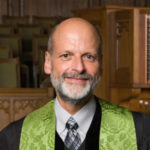 Good morning!
Good morning!
I hope this day finds you and your family well. I invite you to take a few moments with me to read and reflect upon today’s scripture selection — and to carry these thoughts with you into your day.
Today’s Scripture: Revelation 1:4b-8 (Part 2)
I saw a poster a few years ago which listed all the titles of Jesus that appear in the Bible. There are dozens: Bread of Life (John 6:48), Captain of Salvation (Hebrews 2:10), The Christ (Matthew 16:20), Everlasting Father (Isaiah 9:6), Prince of Peace (Isaiah 9:6), Messiah (John 1:41), The Word (John 1:1), Lamb of God (John 1:29), Wonderful Counselor (Isaiah 9:6), to name a few.
Tim’s Devotional Reflection for Today
In today’s reading from Revelation, the writer uses several titles to get at the nature of Jesus Christ: the Faithful Witness, the Firstborn of the Dead, the Ruler of Kings on Earth, and Alpha and Omega. These titles can speak to us even today.
Jesus Christ is the Faithful Witness. John 1:18 says, “No one has ever seen God. It is God the only Son, who is close to the Father’s heart, who has made him known.” Jesus is the one who has revealed God to us. If you want to see what God is like, look at Jesus. You will see God’s concern for everyone, especially the powerless, the poor, the dispossessed, the oppressed, and the marginalized.
Jesus Christ is the Firstborn of the Dead. This strange phrase expresses the good news of the resurrection and our hope in the life to come. Jesus’ resurrection was the first of many, John is saying. The quality of life we call “eternal” is ours through Christ, who is the firstborn of the dead. Paul uses similar language in 1 Corinthians 15:20, where he says that Christ is “the first fruits of those who have died.”
Jesus Christ is the Ruler of Kings on Earth. John wrote to a people undergoing terrible persecution at the hands of the Roman Empire because of their faith in Christ. John himself was in exile on the isle of Patmos. John knew that the persecution was bound to get worse and that Rome would continue to bloody its hands with the lives of the faithful.
John wanted to communicate to the Christians in the Roman province of Asia that Jesus is Lord. “Jesus is Lord” rolls off our tongues so easily, but they were not safe words to speak in the first century and even today in some parts of the world. At the end of the first century CE, being overheard speaking those words could mean imprisonment, exile, or even death.
Why? Just think about what we are saying when we speak those words. We are saying that Jesus is the ultimate authority, and it is Jesus’ rule which is most important. When we say “Jesus is Lord,” we pledge ultimate allegiance only to him. The Romans could not tolerate that idea. Only the Roman emperor was the “ruler of kings on earth.”
To say that Jesus Christ is the Ruler of Kings on Earth is to say that the principles Jesus taught stand above every authority.
To say that Jesus is the ruler of all is to say something about how we are to live. Jesus came teaching about another kingdom—the kingdom of God. The kingdom of God is wherever and whenever the will of God is done “on earth as it is in heaven.”
The eighth verse says, “‘I am the Alpha and the Omega,’ says the Lord God, who is and who was and who is to come, the Almighty.” When John greets the seven churches of the Roman province of Asia, he says, “Grace to you and peace from him who is and who was and who is to come.”
That title sums it all up: Alpha and Omega, the first and last letters of the Greek alphabet. J. B. Phillips, many years ago, wrote a book entitled Your God is Too Small. He pointed out that we tend to narrow God, put God in a box, and create God in our own image. It is a tendency to trivialize God to make God too small. The Book of Revelation says that God is all: Alpha and Omega, A and Z, Beginning and End.
The Hebrew version of “alpha and omega” would be “aleph and tav.” Jewish scholars have sometimes referred to God as “Truth” to emphasize the middle, the here-and-nowness of God’s abiding presence. In Hebrew, the word truth is Emet. Emet is spelled aleph, mem, tav. These three letters represent the entire alphabet: aleph is the first letter, mem is the middle letter, and tav is the final letter.
When we experience God, what else can we say? If we could go back and look at the beginning, we would find God. If we could go forward and look at the end, we would find God. If we could go to the farthest limits of space (if there are any), we would find God. If we were to break matter down to the most basic, minute component, we would find God. God is the alpha and the omega, the A and the Z, the beginning and the end. God is the aleph, mem, and tav.
The late New Testament scholar Joachim Jeremias grew up as a child of German missionaries in Israel. When the Third Reich came to power, the relationship between the German people and the Jewish people became hostile and painful. The family left. Then came the second world war and the Holocaust.
Years later, Jeremias wished to return to Israel. He wanted to see if anybody remembered him as a young person and would say to him, “Joachim, we forgive you.” He said, “I returned to Israel long after the war. I knocked on door after door. I couldn’t find anybody. I came to one house and thought surely someone is here, and they will let me in. I knocked, and a man answered. I remembered him. “I’m Joachim Jeremias.”
The man said, “Please come in. It is good you came at this time,” said the Jewish host. “We are celebrating the feast of Succoth, which is the festival of tabernacles. Come into our backyard.” The family had erected a booth for the feast. There was a brush arbor with fruit hanging down. The family would enter through a little doorway and tell the story of Israel’s life in the wilderness.
Professor Jeremias noticed a little piece of paper clipped to one side of the doorway and another piece of paper clipped to the other side of the opening. There was a word on one side and another word on the other side. The words were in Hebrew. Jeremias asked his host, “What are those words?” He replied, “That is a summary of Psalm 139: ‘Where can I go from your spirit? Or where can I flee from your presence? If I ascend to heaven, you are there; if I make my bed in Sheol, you are there. If I take the wings of the morning and settle at the farthest limits of the sea, even there your hand shall lead me, and your right hand shall hold me fast'” (Psalm 139:7-10).
Jeremias said, “I don’t understand.” The man said, “Well, that word on the left is ‘from God.’ This word on the right is ‘to God.’ In between, we live from God … to God.” (Fred B. Craddock, as recounted by William G. Carter in Sermons on the Gospel Readings, Series 1, Cycle B, Lima, Ohio: CSS Publishing Compancy, 2002, p. 393)
We live “from God to God.” God is aleph mem tav, the beginning, the present, and the end. We live in this promise. While Revelation is full of unsettling visions and disturbing pictures, the first word of this book is identical to the last word. The beginning and the end are the same. As the writer addresses this book to the church, he greets them by saying, “Grace to you, and peace from him who is, and who was, and who is to come” (Revelation 1:4). As the book comes to an end, the last words are, “The grace of the Lord Jesus be with all the saints.”
The first word and the last word are the same, and the word is grace.
Even when the future looks bleak, God is there. As the gospel singer put it, “I know not what the future holds, but I know who holds the future.”
Hymn: “Of the Father’s Love Begotten” by Aurelius Clemens Prudentius; translated by John Mason Neale (1851) and Henry W. Baker (1859)
Of the Father’s love begotten
ere the worlds began to be,
he is Alpha and Omega,
he the source, the ending he,
of the things that are, that have been,
and that future years shall see
evermore and evermore.
Oh, that birth forever blessed
when the virgin, full of grace,
by the Holy Ghost conceiving,
bore the Savior of our race,
and the babe, the world’s Redeemer,
first revealed his sacred face
evermore and evermore.
This is he whom seers and sages
sang of old with one accord,
whom the voices of the prophets
promised in their faithful word.
Now he shines, the long-expected;
let creation praise its Lord
evermore and evermore.
Let the heights of heav’n adore him,
angel hosts his praises sing,
pow’rs, dominions bow before him
and extol our God and King.
Let no tongue on earth be silent,
ev’ry voice in concert ring
evermore and evermore.
Christ, to thee, with God the Father,
and, O Holy Ghost, to thee
hymn and chant and high thanksgiving
and unending praises be,
honor, glory, and dominion
and eternal victory
evermore and evermore.
Thank you for sharing this moment of your day with me, with God, and with these reflections on a portion of scripture. I hope you will carry these with you throughout your day and night.
Grace and Peace,
![]()
Dr. Tim Bruster
Senior Pastor

